I’m going to tell you as little as possible about the film I See the Demon: when I saw it a few days ago, I kept thinking it reminded me of another film, but then, before a few minutes had passed, it turned out to be quite different. There was certainly a lot to talk about when I met with its director and co-writer, Jacob Lees Johnson, who also brought along two of the cast: Alexis Zollicoffer, who played the central character, Lucy; and Noah Kershisnik, who played her boyfriend, Ellis. Hopefully, our conversation will whet your appetite.
The tone of the film was very inviting, full of rich colours and textures; it reminded me of Amy Seimetz’s film She Dies Tomorrow, for some reason. I asked Jacob how he used the tone of the film to balance the horror and psychological elements, careful to avoid either one overshadowing the other. “I like movies that say a lot,” he said, “where you can explore different avenues and interpretations. But I think it started with the concept, and then the characters who inherited that world, because even though it’s a science-fictiony world, the characters had to be real people who talked fast, talked over each other, and that sort of thing. We wanted it to be a real party, with real friends. In terms of balancing the elements, we just tried to follow the characters and as long as the audience finds them believable, and that what is happening to them is a natural extension of the situation (or in the case of Lucy, her trauma), then it works. It’s a fairly unconventional blend of genres, but what we’ve seen from audience reactions so far has been really satisfying because it does focus on the characters.”
I took the opportunity meeting some of the cast to ask whether they had worked together to build the underlying sense of distrust and uncertainty that we see throughout the film. “Noah and the others knew each other beforehand,” said Alexis. “I didn’t know any of them, so that definitely helped with the awkwardness between Lucy and everyone else, feeling like a stranger in a most intimate place, her own home. It felt very real, and gave me an ability to see all of the characters and their flaws, and maybe the things about them which are really grinding on her that helped to exacerbate the tension.”
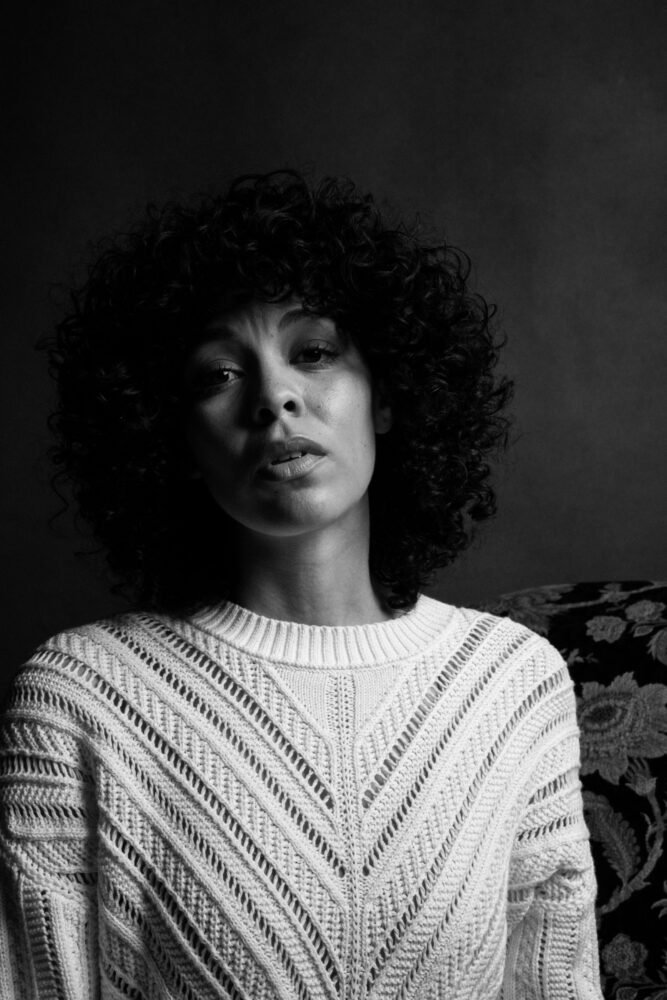
Noah took it from there: “I knew almost the whole cast from before, other than Alexis and Jon [Jon Heder, who played one of the party guests, Roger]. Jacob got those of us who lived nearby together to practise the chemistry of that group, so we felt like old friends. We were able to get together to improvise and feel really comfortable with each other, which helped. Then Alexis was brought in on the day we started shooting; I don’t think that was intentional – Jacob might have included her in the prep stuff if she’d been around – but it actually worked really well, making her feel like a real outsider. We see the story through her eyes, and something is a little off for her.”
There was an odd-one-out character, Billy (played by Dave Martinez), who didn’t have much to say at first, but then steadily developed some interaction with everyone else. I asked whether Dave had been involved with the same preparation process. “No, he was another one who we wanted to feel different,” Jacob said. “So we didn’t bring him in to those improv rehearsals. I think it worked really well. Dave’s an excellent actor, but keeping them separate, logistically, helped establish the sense of isolation that we needed.”
“Dave and I became close in the process,” Alexis added, “so when you see Lucy seeking that comfort in Billy and Ellis, that made an interesting dynamic between the three of us as well.”
On the subject of comfort, well, the whole film took place in what should have been a comforting setting; Lucy’s home, and not only that, but her birthday party, an event that should have been about celebration and intimacy. I asked Jacob what led him to choose that setting. “Realistically, the constraints of our production budget,” he said. “We knew, going into the film, that we had to keep things contained, logistically; but also, that worked in our favour to create a really claustrophobic enclosed space, which Lucy feels like she cannot get out of. If we’d had tonnes of money, we may still have maintained that singular location. As for it being her birthday, that just felt really natural for the story we wanted to tell, of an event that would bring everyone together and give them a natural reason to be there and surprise Lucy, and would also increase her emotional agitation.”
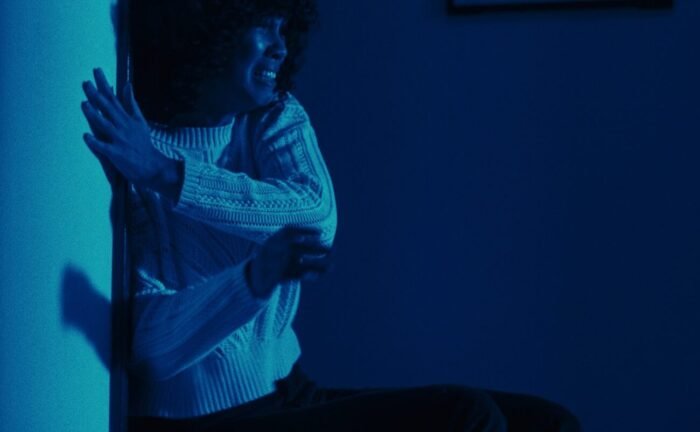
In the middle of Lucy’s birthday, the film also uncovers moments – snapshots, perhaps – of trauma and unwelcome images. I was interested to find out how that approach was developed as part of a character-based story. “So much of my own traumas came up while we were doing that,” said Alexis. “It did help to understand what Lucy was going through. It’s funny about birthdays: they’re kind of inescapable. If you’re at this event, and you’re the main person everyone is there to see, you kind of have to try to work through it, even though you just want to hide in your room. So it was really interesting to think about times in my own life – and hers – and wonder what it says about where she is and why it is being brought up right now. It definitely took a lot of inner work, and right before set, I had a lot of conversations with other people outside of it about Lucy and what she was dealing with; so as I went into each scene, I could go ‘yes, this is the scene that triggers this, and why she can’t just be cool, but she’s so upset,’ having already processed it myself.’”
What I had found especially interesting were the colours and textures that made everything warm and inviting at first, but then too much richness after a while. Often in psychological dramas, the opposite is used: gritty, concrete settings. I asked Jacob why he chose one direction rather than the other for the feel of the film. “We wanted to make a physical space that would be warm and welcoming,” he said, “but we also wanted it to feel stuffed: it’s a very nice location, with an eclectic vibe to establish our characters’ lifestyles. But the camera work is all hand-held and pretty frenetic with lots of cuts; that’s just to create a sense of claustrophobia. The colours at the beginning of the film are quite different to near the end, which was fun to play with over time with colour-correction, film grain, and so on, giving us a view to her changing frame of mind. That was actually one of my favourite aspects of making the film, though of course there were stressful aspects too.”
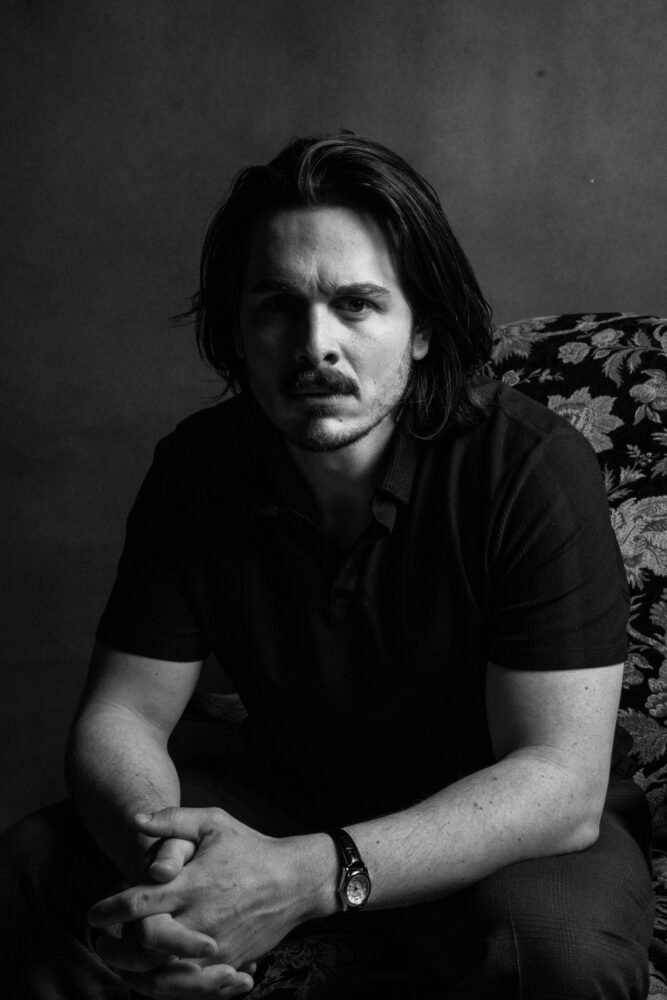
I took a guess that maybe one of the stressful elements was about getting the continuity to work in the looping segments of the story. “The whole shoot was tricky, to be fair,” Jacob said. “That element in itself wasn’t too challenging; it was just really tricky because we were confined within this one location: we were all there, and poor Alexis was in virtually a perpetual state of night for the whole duration, and that was taxing. We were literally on top of each other: at one point, we had two units in the house, with one on the top floor and the other unit shooting in the basement; but that’s what you have to do when you’re trying to get a movie made without tonnes of resources. So that was the main stressor, but for the cast it may have been different.”
Noah had a different tale. “Honestly? I had a great time,” he said. “The main thing I was concerned about was making sure that Alexis felt supported and had what she needed to get through her emotional stuff. I wanted to be there for her, but also out of the way when she needed space. That was what I was most stressed about, because Alexis is a really great actor, and where I want to keep things safe, she just wants to push in and do it, without any safety. I didn’t want her hurt, but I did want to respect her doing it her way. Mostly a great experience, though,” he concluded with a modest smile.
It did sound like Noah was describing his own character was doing in the film, too. Ellis had to steer Lucy safely through the evening, as well as making sure it went the right way.
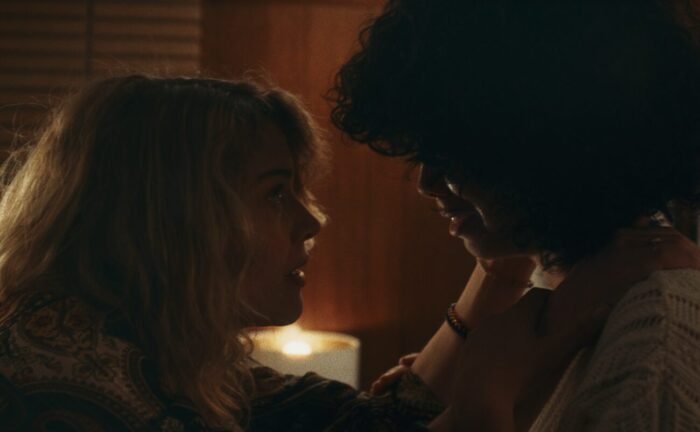
I couldn’t watch a film set in a civilised party without asking its creator if he had found influences in such films as The Invitation or Coherence. “Yeah, Coherence was certainly an influence in the sense that it gave us a logistical path for how we could tell a story in a single location. It does have some narrative similarities, those weren’t intentional, and they kind of came after the idea. But we did look at Coherence as a model for how you can pull this off: a group of people improving dialogue. The bigger influence, for me, were Safdie brothers’ films, like Good Time, because I really love that crazy, unstable camera and lots of dialogue all over each other, along with the gritty, textured look. I like the idea of doing that in a science fiction film, particularly to contrast with other sci-fi films, which are often sleek and hyper-technological. We wanted a sci-fi world which was very grounded, real-life and day-to-day.”
The film certainly felt like a very near future, when the viewer steadily realises, near the beginning, that it is the future. That makes the ending somewhat unnerving. I was interested to ask what Jacob hoped his viewers would make of the ending. “I don’t want to give away too much, of course, but there are multiple ways of looking at the ending,” Jacob said. “For me, what I wanted was to set up a story that would allow for a kind of wide interpretation; there is not one right response. I remember when we did a test screening, and we asked a question about one of the things that happens to a primary character. We had some very different reactions; one person saying, ‘I think they should have done this,’ and another saying, ‘I agree with what they did.’ That was really satisfying: I just want people to walk away in a contemplative space, where they think about the ideas, and relationships in their own lives, and broader social dynamics that are hinted at in the film.”
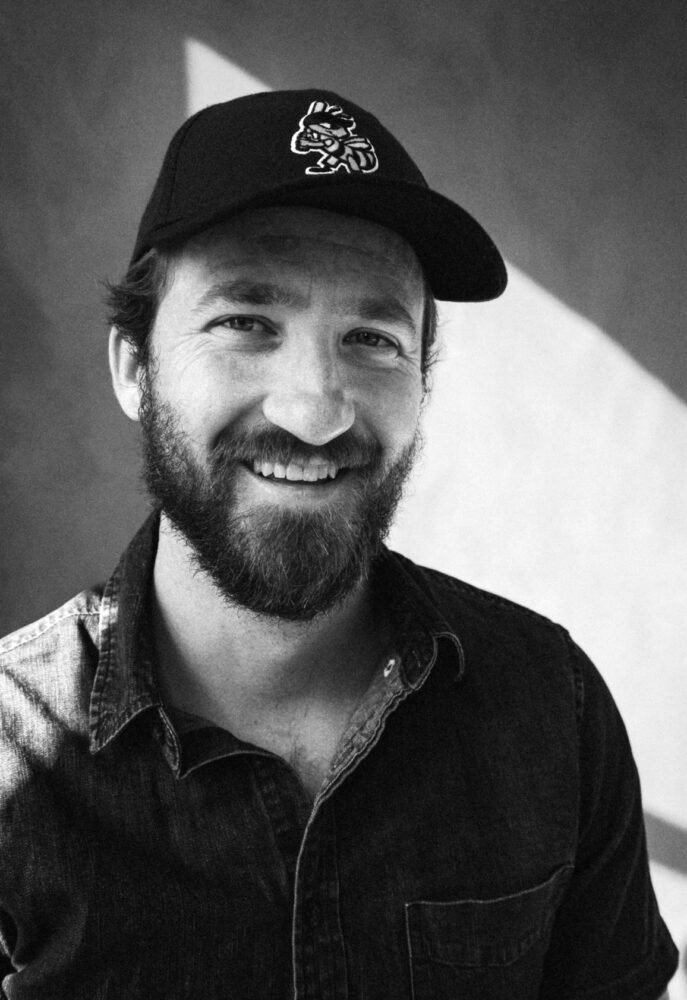
This prompted me to ask whether my other guests would have wanted their characters to take things in a different way. Alexis’ character had hardly any choice, mind you. “I had no choice,” Alexis agreed. “And that’s a huge part of the conversation: Lucy’s choice is taken away. But I do think there are other characters that advocate a lot, and it’s interesting to consider whether that actually worked.”
Again, Noah had a different perspective: “If I was Ellis, I’d have taken things in a different direction right from the beginning! I understand his decision-making and motivations, but I think he is doing the wrong thing from the start. And you were right that what I was going through as an actor is similar to what Ellis was going through in the movie, but – without giving too much away – Ellis thinks that it doesn’t matter what you want, I know what’s best for you, like it or not. Personally, I think people should be able to choose, and I’d like to help them go the way they want, but I don’t decide what’s best for them.”
I’m carefully leaving out the next minute or two of this conversation: it wasn’t made up of spoilers, as such, but too suggestive of what to expect. It’s very apparent to me, though, that these actors thought a great deal of the people they became and the implications of their hard choices. But what it came down to for Noah was this: “I do think that Ellis was wrong.”
On the subject of difficult choices, I turned to the question of the film’s title, I See the Demon, and blurted out ‘What were you thinking?’ “Initially, we had a different title,” Jacob said, “but it was deemed not accessible enough. So we landed on this one, though it took a long time to get there. I really like it because it’s got a lot of different ways you can interpret it, just like the experience I want people to have with the film: there are layers to it. The concept of personal demons versus literal monsters, and there’s this Cartesian philosophy to do with an evil demon that relates to our perception of reality. I also like how it applies to each character differently, and the blind spots we can have: as Lucy sees and understands her own demons, they’re kind of thrown in her face, in an abrupt way. Then the character of Ellis: is he aware of his demons? You can watch the film and observe who is seeing which demons; that’s kind of how I look at it.”
Jacob Lees Johnson’s film, I See the Demon, will be screened on October 14th at Grimmfest in Manchester.




